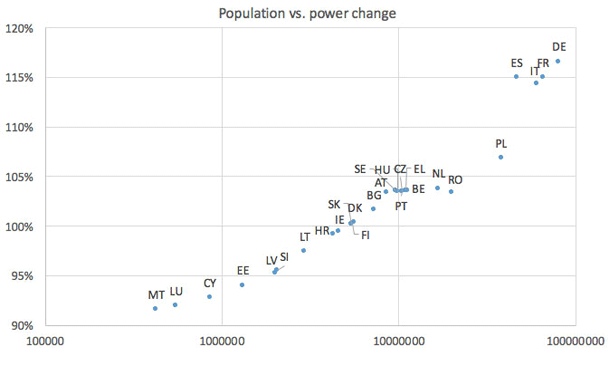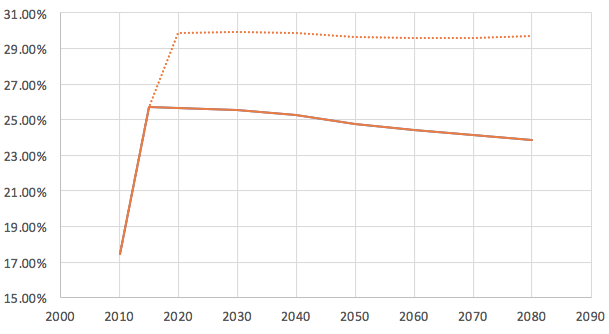
Much of the discussion about Brexit has focused on the UK and has ignored the another party – the European Union. This column examines how the UK leaving the EU would affect the distribution of power among the remaining member states. The larger members such as France and Germany would likely benefit directly from Brexit, at least in terms of power.
Decision-making in the EU is complicated, with the Commission, the Council of the European Union and the European Parliament each having its roles. Of these, the Council – formerly called the Council of Ministers – is the body that is meant to represent national interests. In the Council, each member state is represented by an individual, but a complicated weighted voting method ensures that larger countries have a bigger say in European matters. Since the Lisbon Treaty, the method has no arbitrary weights and is directly applicable to a possible EU without the UK.
Under qualified majority voting, even deciding if a proposal has been accepted requires some calculation, and assessing how much influence each member has on decisions is far from obvious. The Banzhaf index (Banzhaf 1965, Coleman, 1971) and the Shapley-Shubik index (Shapley and Shubik 1954), coming from cooperative game theory, provide mathematical means to calculate the power of each voter, of each member state. The power index of a voter is the conditional probability that if a vote is critical to a proposal, it will be that of the voter in question. Assuming that such critical players can influence a decision, this expresses the probability that a player is able to turn a policy in his interest or to obtain a share of a budget.
Using the latest available population data and population projections (Eurostat 2014) and software that can compute power indices for large games (Bräuninger and König 2005), we have calculated the power of each player before and after a potential Brexit (Kóczy 2016). It is hardly surprising that some of the remaining members would get a larger share of the ‘cake’, but some smaller countries are actually harmed. We also must not forget that the UK is a net contributor, so the budget (the ‘cake’ at hand) is smaller, further harming these small member states. Interestingly, the gain of the larger members is larger than the loss of the budget.
Figure 1 Adjusted share after Brexit as a percentage of the current share

It seems therefore that key members of the EU would directly benefit from Brexit, at least in terms of power. France and Germany together used to have a combined power of 17.5%. This increased to 25.7% thanks to the Lisbon reform; after the Brexit this value would go up to nearly 30%, an increase of over 70% from the value a few years ago.
Figure 2 The combined power of France and Germany with (dotted line) or without (solid line) Brexit

By holding the referendum after the negotiations with the EU, David Cameron put the faith of the referendum into the hands of countries who would, according to this very partial analysis, benefit from Brexit. Perhaps unsurprisingly, the negotiations did not produce breakthrough results.
Author’s note: For the full analysis see Kóczy (2016).
References
Banzhaf, J. F. (1965), “Weighted voting doesn’t work: A mathematical analysis”, Rutgers Law Review, 19, 317–343.
Bräuninger, T. and T. König (2005), “Indices of Power IOP 2.0”, Konstanz: University of Konstanz.
Coleman, J. S. (1971), “Control of Collectives and the Power of a Collectivity to Act”, in B. Lieberman (ed.), Social Choice, New York: Gordon and Breach, pp. 192–225.
Eurostat (2014), EUROPOP2013 – Convergence scenario, national level, Population predictions – [tps00002].
Kóczy, L. Á. (2016), “How Brexit affects European Union power distribution”, IEHAS Discussion Papers No. 16/11, Institute of Economics, Centre for Economic and Regional Studies, Hungarian Academy of Sciences.
Shapley, L. S. and M. Shubik, M. (1954), “A method for evaluating the distribution of power in a committee system”, American Political Science Review 48(3), 787–792.
“This article first appeared on VoxEu.org. Reproduced with permission”
- Bulenox: Get 45% to 91% OFF ... Use Discount Code: UNO
- Risk Our Money Not Yours | Get 50% to 90% OFF ... Use Discount Code: MMBVBKSM
Disclaimer: This page contains affiliate links. If you choose to make a purchase after clicking a link, we may receive a commission at no additional cost to you. Thank you for your support!


Leave a Reply